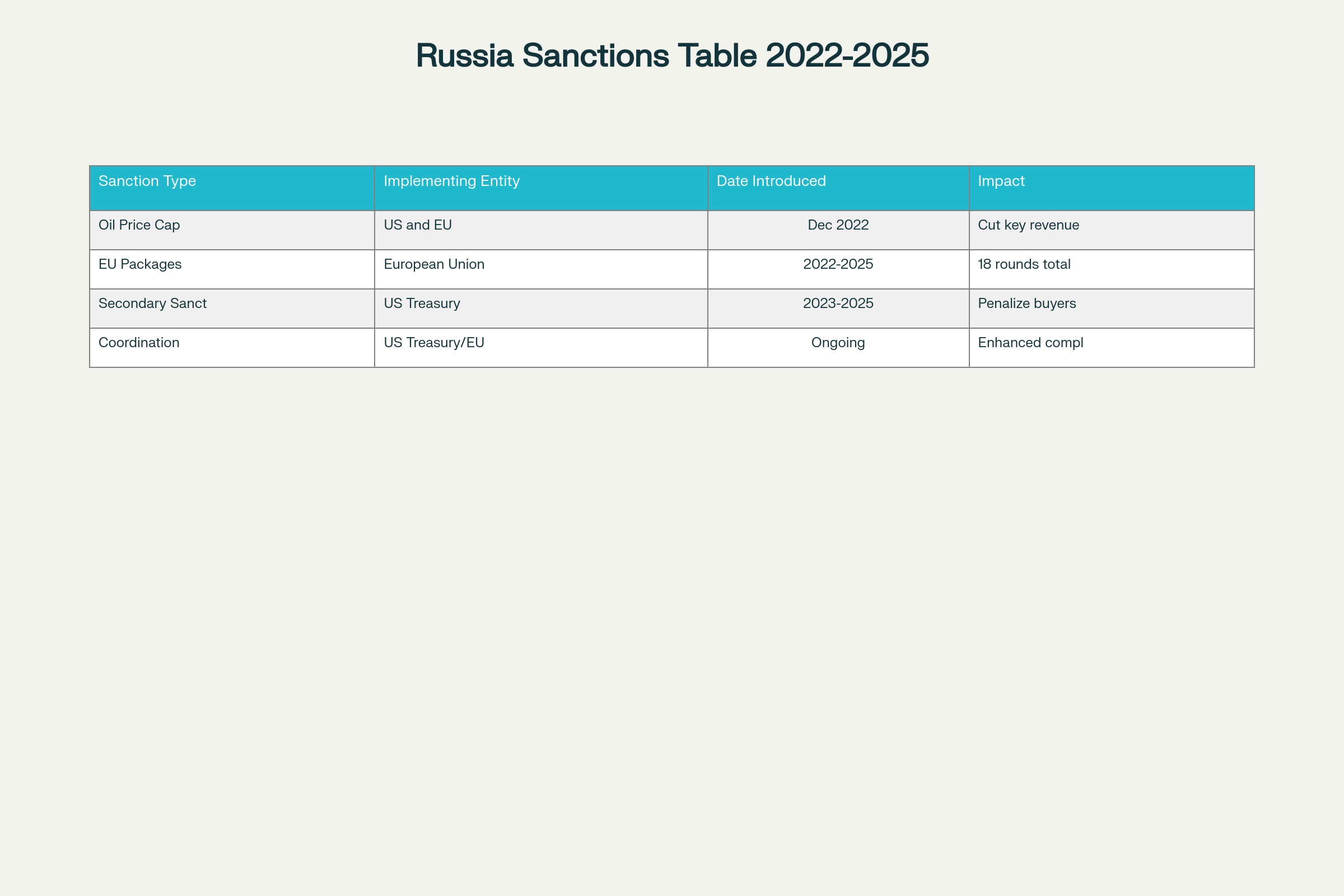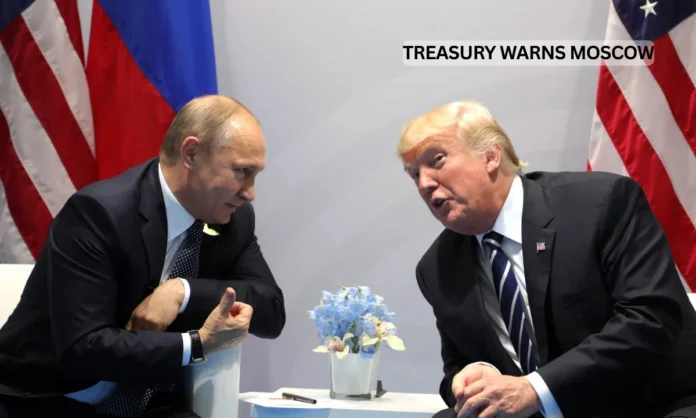Key Highlights:
- Treasury Secretary Scott Bessent declares United States ready for strong measures against Russia, contingent on European Union full cooperation
- US-EU officials conduct high-level discussions on enhanced sanctions coordination targeting Moscow’s revenue streams from oil trade
- European Union prepares 19th sanctions package since 2022 invasion, focusing on Russian banks and energy sector restrictions
Opening Text
The United States is intensifying pressure on Russia through coordinated sanctions efforts, with Treasury Secretary Scott Bessent emphasizing that US Treasury signals strong action on Russia requires comprehensive European support to effectively disrupt Moscow’s war financing mechanisms. Following Russia’s most extensive aerial assault on Ukraine since the conflict began, Bessent’s declarations mark a critical escalation in transatlantic cooperation to squeeze Putin’s economic lifelines. The Treasury Secretary’s comments came after strategic discussions with EU sanctions envoy David O’Sullivan, reinforcing that US Treasury signals strong action on Russia depends on unified Western economic pressure.
Alaska was a show of force by President Trump. He invited Putin to land Russia once owned, showcased U.S. military power, then capped it with a flyover.
— Treasury Secretary Scott Bessent (@SecScottBessent) August 19, 2025
After strong meetings with Zelenskyy and European leaders, the path to peace is clear: Putin and Zelenskyy must meet. pic.twitter.com/wIllong70f
Enhanced US-EU Sanctions Coordination Framework
US officials from multiple departments, including Treasury, White House, State Department, and Trade Representative offices, conducted intensive discussions with European counterparts on Monday and Tuesday to synchronize sanctions strategies. The meeting, lasting less than two hours according to sources familiar with the discussions, covered potential economic sanctions and tariff actions targeting countries that continue trading with Russia.
- Treasury Undersecretary for Terrorism and Financial Intelligence John Hurley joined Bessent in these crucial negotiations
- European delegation led by David O’Sullivan focused on preventing Moscow’s sanctions evasion tactics through global outreach programs
Bessent emphasized on social platform X that “all options remain on the table” as part of President Trump’s strategy to support peace negotiations between Moscow and Kiev. His declaration that “business as usual has not worked” signals a more aggressive approach, stating that US Treasury signals strong action on Russia while demanding European partners “fully join us in this to be successful.”
The Treasury Department’s Office of Foreign Assets Control (OFAC) has enhanced bilateral partnerships with the European External Action Service and European Commission’s financial services directorate, conducting technical meetings to share sanctions expertise and improve implementation capabilities. These collaborative efforts demonstrate how US Treasury signals strong action on Russia through coordinated multilateral approaches that maximize economic impact while minimizing unintended consequences for humanitarian assistance.
Secondary Sanctions Strategy Targeting Russian Oil Revenue
The Trump administration has already imposed 25% additional tariffs on India for its oil trade with Russia, bringing total tariffs to 50% in one of the steepest duty rates globally. This represents a significant escalation in secondary sanctions, which target third-party countries maintaining business relationships with sanctioned entities rather than directly sanctioned parties themselves.
- Secondary sanctions extend beyond primary restrictions by influencing countries not directly governed by US law
- The proposed legislation allows tariffs up to 500% on goods from nations engaging in Russian oil, uranium, natural gas transactions
- Current measures focus on disrupting Russia’s shadow fleet of tankers used for global oil distribution
Bessent indicated the United States is prepared to collaborate with European nations on implementing additional sanctions targeting countries purchasing Russian oil, aiming to destabilize the Russian economy through coordinated pressure. The Treasury Secretary stated that US Treasury signals strong action on Russia specifically through measures designed to cut off key revenue sources funding Putin’s war machine.
Russian officials have repeatedly acknowledged that the crude oil price cap introduced by both US and EU in December 2022 significantly impacts Moscow’s most important revenue source, worsening the Kremlin’s fiscal situation. This demonstrates how US Treasury signals strong action on Russia produces measurable effects when implemented through coordinated international frameworks that leverage the global significance of the US dollar and American financial systems.
European Union’s 19th Sanctions Package Development
The EU is preparing its 19th round of sanctions against Russia since Moscow’s 2022 invasion, targeting approximately six Russian banks and energy companies. This latest package represents the bloc’s continued strategic shift toward more dynamic, extraterritorial, and asset-specific sanctions with enhanced enforcement mechanisms.
- Germany and France are pushing to include Russian oil giant Lukoil in the new sanctions round
- Measures will target Russia’s payment and credit card systems, cryptocurrency exchanges, and oil trade restrictions
- Enhanced focus on preventing circumvention through Central Asian and Middle Eastern intermediaries
EU officials emphasized that energy dependency on Russia will be targeted more aggressively, with particular attention to the Druzhba pipeline transporting Russian oil to Hungary and Slovakia. The European Commission intends to partner with the US on energy-related initiatives, demonstrating how US Treasury signals strong action on Russia aligns with European strategic objectives.
The bloc has already imposed unprecedented costs on Russia through 18 previous sanctions packages, with material impacts on the Russian economy confirmed by senior Russian officials’ admissions regarding revenue losses. These measures reflect how US Treasury signals strong action on Russia catalyzes broader international responses that amplify economic pressure through multilateral implementation strategies.
Strategic Impact Assessment and Economic Warfare Dynamics
Sanctions effectiveness relies heavily on coordination between international partners who can magnify economic and political impact through unified implementation. The US-EU partnership leverages shared values, deep economic ties, and roles in the global financial system to tackle contemporary security challenges through economic instruments.
- Brookings Institution analysis shows US sanctions associated with 80% drop in targeted economic activity
- Multilateral implementation maximizes sanctions effectiveness while minimizing compliance burdens for legitimate business
- Joint counter-evasion efforts include private sector roundtables and coordinated travel to Central Asian monitoring regions
The Treasury Secretary’s assessment that “we are in a race now between how long can the Ukrainian military hold up, versus how long can the Russian economy hold up” underscores the strategic timing of enhanced sanctions coordination. His prediction that combined US-EU measures could result in “total collapse” of the Russian economy demonstrates confidence that US Treasury signals strong action on Russia will achieve decisive strategic outcomes.
Current sanctions architecture focuses on disrupting Russia’s adaptation strategies, including trade shifts to China, India, Turkey, and United Arab Emirates. The coordinated approach addresses Moscow’s use of shadow tankers and third-country intermediaries to maintain oil distribution networks, showing how US Treasury signals strong action on Russia evolves to counter Russian evasion tactics through comprehensive multilateral frameworks.

Key Sanctions Data Points on Russia by US and EU (2022-2025)
Final Assessment and Strategic Implications
The intensification of US-EU sanctions coordination represents a critical juncture in economic warfare against Russia’s continued aggression in Ukraine. US Treasury Secretary Bessent’s emphatic declarations that US Treasury signals strong action on Russia contingent on European cooperation highlight the fundamental importance of unified Western economic pressure in achieving strategic objectives. The development of the EU’s 19th sanctions package, combined with enhanced secondary sanctions targeting third-party enablers, demonstrates unprecedented coordination between traditional allies facing shared security challenges.

The strategic framework emerging from these discussions positions economic sanctions as primary instruments for compelling Russian policy changes without direct military intervention. Success depends on maintaining coalition unity while adapting to Russian circumvention attempts through shadow networks and alternative trading relationships. The collaborative approach between US Treasury and EU institutions establishes precedents for future economic statecraft operations requiring multilateral coordination to achieve maximum strategic impact against state actors threatening international stability.


